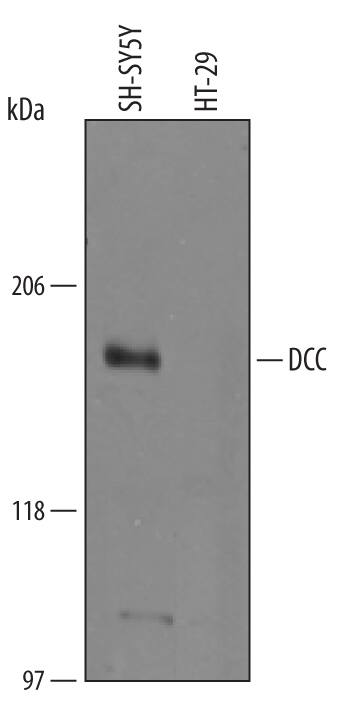Human DCC Antibody
R&D Systems, part of Bio-Techne | Catalog # AF5884

Key Product Details
Species Reactivity
Applications
Label
Antibody Source
Product Specifications
Immunogen
Ser1323-Phe1447
Accession # P43146
Specificity
Clonality
Host
Isotype
Scientific Data Images for Human DCC Antibody
Detection of Human DCC by Western Blot.
Western blot shows lysates of SH-SY5Y human neuroblastoma cell line and HT-29 human colon adenocarcinoma cell line. PVDF membrane was probed with 1 µg/mL of Sheep Anti-Human DCC Antigen Affinity-purified Polyclonal Antibody (Catalog # AF5884) followed by HRP-conjugated Anti-Sheep IgG Secondary Antibody (Catalog # HAF016). A specific band was detected for DCC at approximately 190 kDa (as indicated). This experiment was conducted under reducing conditions and using Immunoblot Buffer Group 1.Applications for Human DCC Antibody
Western Blot
Sample: SH-SY5Y human neuroblastoma cell line and HT-29 human colon adenocarcinoma cell line
Formulation, Preparation, and Storage
Purification
Reconstitution
Formulation
Shipping
Stability & Storage
- 12 months from date of receipt, -20 to -70 °C as supplied.
- 1 month, 2 to 8 °C under sterile conditions after reconstitution.
- 6 months, -20 to -70 °C under sterile conditions after reconstitution.
Background: DCC
Deleted in colorectal cancer (DCC) is a 170-190 kDa transmembrane glycoprotein that contains four Ig-like domains and six fibronectin type III repeats in its extracellular domain. DCC is expressed on axons during development where its binding to Netrin-1 regulates axon migration and myelination. It inhibits apoptosis when bound by Netrin-1 and can induce apoptosis in the absence of ligand. DCC also functions as an adhesion molecule and a tumor suppressor on intestinal epithelial cells. Deficiencies in DCC function are associated with the development and metastasis of many tumors. Within aa 1323-1447 of the cytoplasmic domain, human DCC shares 98% aa sequence identity with the mouse and rat DCC.
Long Name
Alternate Names
Gene Symbol
UniProt
Additional DCC Products
Product Documents for Human DCC Antibody
Product Specific Notices for Human DCC Antibody
This product or the use of this product is covered by U.S. Patents owned by The Regents of the University of California. This product is for research use only and is not to be used for commercial purposes. Use of this product to produce products for sale or for diagnostic, therapeutic or drug discovery purposes is prohibited. In order to obtain alicense to use this product for such purposes, contact The Regents of the University of California.
U.S. Patent # 5,939,271, 6,277,585, and other U.S. and international patents pending.
For research use only
